
Virginia Lilian Emmeline Compton-Mackenzie,, known professionally as Fay Compton, was an English actress. She appeared in several films, and made many broadcasts, but was best known for her stage performances. She was known for her versatility, and appeared in Shakespeare, drawing room comedy, pantomime, modern drama, and classics such as Ibsen and Chekhov. In addition to performing in Britain, Compton appeared several times in the US, and toured Australia and New Zealand in a variety of stage plays.
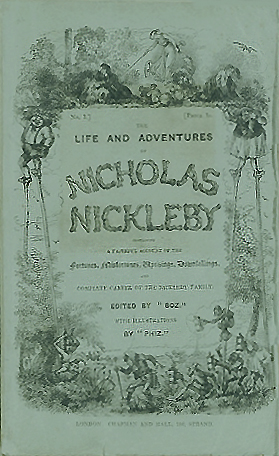
Nicholas Nickleby, or The Life and Adventures of Nicholas Nickleby, is the third novel by Charles Dickens, originally published as a serial from 1838 to 1839. The character of Nickleby is a young man who must support his mother and sister after his father dies.

Smike is a pop musical adaptation of a small part of Charles Dickens' 1839 novel Nicholas Nickleby, that was televised for the BBC in 1973. The musical is based on the character Smike from that novel. The TV production starred Beryl Reid as Mrs Squeers, Andrew Keir as Mr Squeers, Leonard Whiting as Nicholas, and Ian Sharrock as Smike. The original cast also featured DJ Neil Fox, a pupil at Kingston Grammar, as one of the schoolboys. A cast album was released on Pye records, including the songs from that production, but not all of the songs used in the stage version. The complete score was re-recorded in 1983 and released on a double album featuring Jill Gascoine, Oliver Tobias and Mike Holoway.

The Life and Adventures of Nicholas Nickleby is a British TV film which aired in 2001, directed by Stephen Whittaker, based on the 1839 novel Nicholas Nickleby by Charles Dickens.

The Life and Adventures of Nicholas Nickleby is an 8½ hour-long adaptation of Charles Dickens’ 1839 novel, performed in two parts. Part 1 was 4 hours in length with one interval of 15 minutes. Part 2 was 4½ hours in length with two intervals of 12 minutes. It was originally presented onstage over two evenings, or in its entirety from early afternoon with a dinner break. Later it was presented on television over four evenings.
Suzanne Bertish is an English actress.
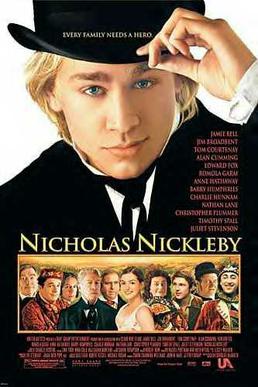
Nicholas Nickleby is a 2002 British-American period comedy-drama film written and directed by Douglas McGrath. The screenplay is based on The Life and Adventures of Nicholas Nickleby by Charles Dickens, which originally was published in serial form between March 1838 and September 1839. Charlie Hunnam stars in the title role alongside Nathan Lane, Jim Broadbent, Christopher Plummer, Jamie Bell, Anne Hathaway, Romola Garai, Alan Cumming, and Timothy Spall.

The Life and Adventures of Nicholas Nickleby is a 1947 British drama film directed by Alberto Cavalcanti and starring Cedric Hardwicke. The screenplay by John Dighton is based on the Charles Dickens novel The Life and Adventures of Nicholas Nickleby (1839). This first sound screen adaptation of the book followed silent films released in 1903 and 1912.
"The Beggar's Petition" is a poem written by Thomas Moss and published anonymously in 1769 which "contains much pathetic and natural sentiment finely expressed." The poem is referenced in the opening pages of Jane Austen's Northanger Abbey as an example of a poem commonly memorized by young women of the day.
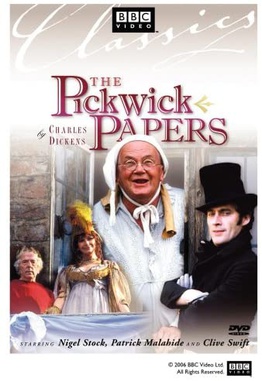
The Pickwick Papers is a twelve-part BBC adaptation of the 1837 novel The Pickwick Papers by Charles Dickens, first broadcast in 1985. It starred Nigel Stock, Alan Parnaby, Clive Swift and Patrick Malahide, with narration by Ray Brooks.

Sarah Jane Woolgar was an English stage actress. She had leading roles in plays by notable dramatists of the day, including original productions. She had a long association with the Adelphi Theatre in London.
Nicholas Nickleby is a 1912 American silent short drama film directed by George Nichols, adapted from Charles Dickens' 1839 novel of the same name. The two-reel film stars Harry Benham in the title role and Mignon Anderson.
The eighteenth series of the British television drama series Grange Hill began broadcasting on 3 January 1995, before ending on 10 March 1995 on BBC One. The series follows the lives of the staff and pupils of the eponymous school, an inner-city London comprehensive school. It consists of twenty episodes.

The Life and Adventures of Nicholas Nickleby is a nine-hour adaptation of the novel by Charles Dickens. It is a recording of the stage play by The Royal Shakespeare Company at The Old Vic in London. It was Channel 4's first major drama commission.
Nicholas Nickleby is a British television series which first aired on the BBC in 1957. It is based on the novel Nicholas Nickleby by Charles Dickens.

Nicholas Nickleby is a British television series which first aired on BBC 1 in 1968. It is based on the novel Nicholas Nickleby by Charles Dickens, following a compassionate young man who, after the death of his father, tries to save his friends and family from his wicked uncle, and earn a living strong enough to support them.
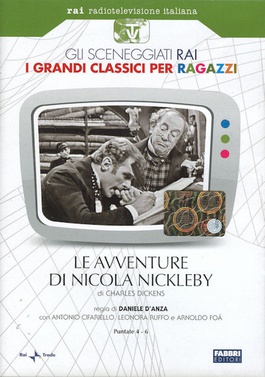
The Adventures of Nicholas Nickleby is an Italian television series which first aired on RAI 1 in 1958. It is based on the novel Nicholas Nickleby by Charles Dickens.

The Saracen's Head was an inn on the north side of the street to the west of the church of St Sepulchre-without-Newgate in Snow Hill, London. When Sarah Ann Mountain was in charge they made stagecoaches here and fifteen of them left each day for destinations including Birmingham and Leeds.
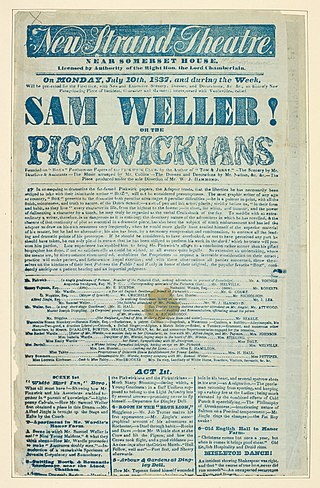
Samuel Weller, or, The Pickwickians is an 1837 comedy in three acts adapted from Dickens's novel The Pickwick Papers by William Thomas Moncrieff. It was first performed at the Royal Strand Theatre in London on 17 July 1837.














